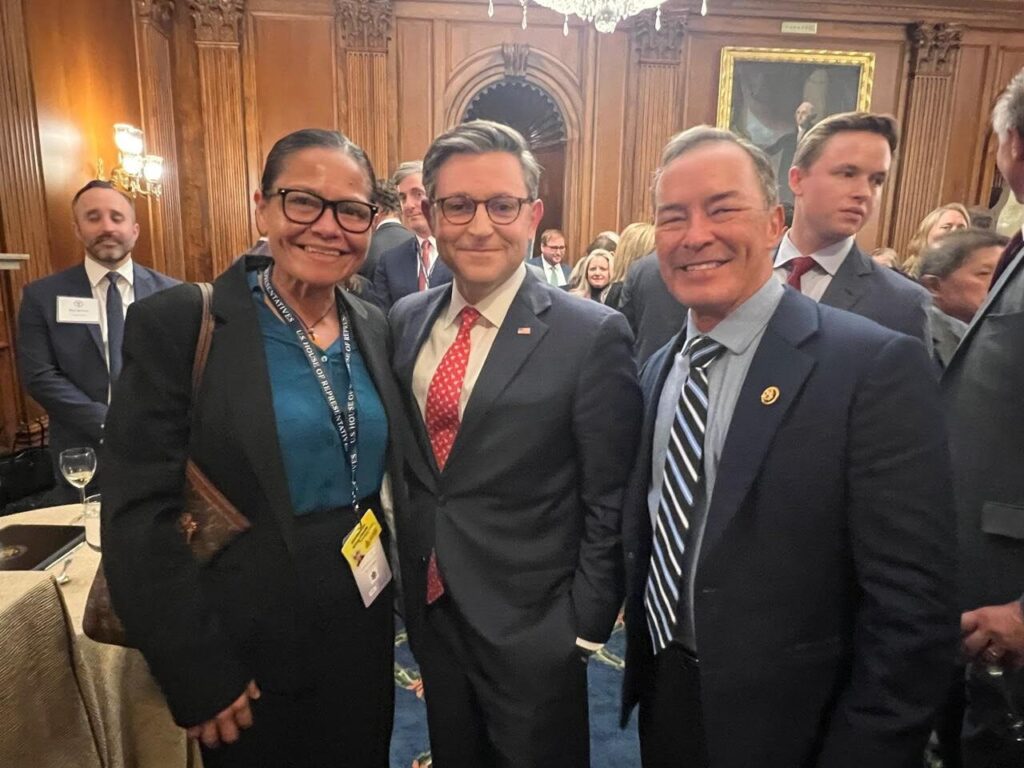
U.S. Congresswoman-elect Kimberlyn King-Hinds of the CNMI, left, and U.S. Congressman Jim Moylan of Guam, right, attend a reception hosted by Speaker of the U.S. House of Representatives Mike Johnson of Louisiana in Nov. 2024.
ELECTED as the new CNMI delegate to the U.S. Congress, Kimberlyn King-Hinds campaigned for a stronger, tourism-based economy.
A Tinian Republican, she won a five-way race in November by defeating House Floor Leader Edwin Propst, business consultant and grant writer John Oliver Gonzales, former educator James Rayphand, and Chamorro rights advocate Liana Hofschneider.
King-Hinds will succeed U.S. Congressman Gregorio Kilili Camacho Sablan, a Democrat, who did not seek a ninth term.
An attorney and former board chair of the Commonwealth Ports Authority, King-Hinds said her top priorities focus on reviving the CNMI economy. These include restoring the tourism industry, securing the islands’ needed labor force, addressing the CW program, which will end in 2029, and tackling the high cost of living, especially utilities.
She vowed to work on the reinstatement of Annex VI of the U.S.-China Civil Air Transport Agreement, which exempted the CNMI from a federal order that limits the number of round-trip flights between the U.S. and China.
“We need to open up all markets,” she added.
Noting the competitive nature of the tourism industry, King-Hinds also acknowledged the need to diversify the CNMI economy.
“The tourism industry has been the breadbasket of the CNMI, and I do agree that we also need to diversify the economy, but we can’t just throw the baby out with the bathwater and say, ‘Oh, we’re just going to focus on what’s happening now with the military.’ Or ‘Let’s wait and you know, find or create a new industry.’ We gotta fix and remove the barriers right now that’s stopping our tourism industry from fully thriving, and that’s the focus, and I’m not waiting until I get sworn in to start working on that.”
Tourism arrivals in the CNMI have yet to recover from the effects of the Covid-19 pandemic, which shut down air travel worldwide.
In the incoming 119th U.S. Congress, King-Hinds was appointed by the Republican leadership to the U.S. House Transportation and Infrastructure or T&I Committee.
She noted that the committee oversees matters related to federal transportation systems, water infrastructure, maritime commerce, and economic development — making it a key driver of initiatives to improve connectivity, strengthen trade, and support communities like the CNMI.
She emphasized the importance of her appointment in addressing the CNMI’s immediate infrastructure needs, particularly regarding ports, utilities, and transportation systems, which are essential for economic development, community well-being, public safety, and disaster preparedness.
“This committee plays a vital role in shaping policies that directly impact the CNMI, from establishing reliable and affordable transportation networks to addressing infrastructure needs and strengthening our economy that is so reliant on access to the world,” she said.
“The transportation challenges of our islands have been limiting opportunities for our people, and the soaring costs of basic utility services are top of mind for nearly all our residents. I look forward to taking this opportunity to work with my colleagues [in the U.S. Congress] and ensure that the CNMI’s unique challenges and opportunities are part of the national conversation, and see results for our people,” she added.
King-Hinds also acknowledged increased federal and military engagement due to the CNMI’s strategic role in national and regional defense.
The U.S. Department of Defense is currently building a $383 million Tinian Divert Airfield, which will serve as an alternative landing site for the nation’s military aircraft if Andersen Air Force Base in Guam becomes inaccessible due to war or natural disaster. The project aims to enhance the strategic capabilities of the U.S. Air Force in the Pacific region.
But King-Hinds said “supporting our country’s security should not come at the expense of our ability to grow and develop resources that enable true self-governance.”
Still, a “weakened private sector has necessitated greater levels of collaboration with the federal government,” she added. “More than ever, we need to engage our federal government and effectively communicate our needs to ensure that the actions of our government support the growth and well-being of our people.”
“I cannot do it alone,” King-Hinds added. “The job of the delegate is to be your voice, and…I need everybody’s help. I need everybody to come and have a seat at the table to have these conversations.”











